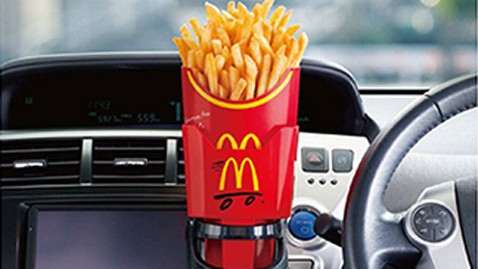Save the planet, don’t eat French fries
18 Jul
What emits more CO2 – 1 kg of French fries, or 1 kg of gasoline? And what does all this have to do with the EU? Find out in our post below.
Last week the European Union approved adding several other industries to the list of those threatened by so-called “carbon leakage” (see box), which means they will receive their emission trading quotas cheaper. Among other new entrants in this group are French fries producers.
Who would have thought that making frozen French fries was so CO2-intensive? If I were to own a French fries company, I would of course try to convince decision-makers of the same thing, so that I could receive my quotas for free. From now on, the packaging of French fries should include not only its nutritional value, but also information on its CO2 footprint.
 Source: abcnews.com
Source: abcnews.com
French fries vs. gasoline
We already knew that beef production is very CO2-intensive, but were really surprised how much CO2-emissions the production of French fries takes. According to data available on the net, producing 1 kg of frozen French fries corresponds to 5.7 kg of CO2 emissions; this figure is much higher than the 3.6 kg of CO2 associated with 1 kg of gasoline (considering the entire product lifecycle). While most of the emissions originate from agricultural activity in the case of beef (to put it bluntly: cattle eat a lot), the carbon footprint of French fries comes mostly from food processing (cooking, cooling, etc.).
“Carbon leakage” (aka CO2 leakage) is not some abstract physical phenomenon you should have picked up during high school chemistry lessons. Instead, it is an economic principle used to describe a situation where “domestic” (i.e. EU) companies that have to pay for their CO2 emissions are at a disadvantage compared to “foreign” (i.e. non-EU) companies who do not have to comply with such regulations; therefore, “foreign” companies are more likely to produce the given product. This means that any mitigation of “domestic” CO2 emissions may ultimately just be illusory, since the EU’s environmental protection scheme imposes such heavy burdens on companies that they could lose out in the market competition against non-EU competitors. This would shift production outside of the EU, and the CO2 emissions would “leak out” along with companies. The EU tries to combat this by giving a portion of quotas to industrials for free, instead of allocating them via auctions.
The problem is real, but its solution is… strange, to say the least, or at least fairly typical over the EU’s bureaucratic zeal. Companies use their resources not to find a way of reducing CO2 emissions, but to lobby for receiving their quotas for free.
Instead of paying record-low prices of around 4 €/t for CO2 emissions… The irony of the situation is that if the profitability of a company ultimately depends on whether it receives these incredibly cheap quotas for free, then you probably shouldn’t invest your money in that company in the first place.
If you liked the post, follow Barrelperday on Facebook!
Or subscribe to our Twitter feed or Newsletter


No comments yet